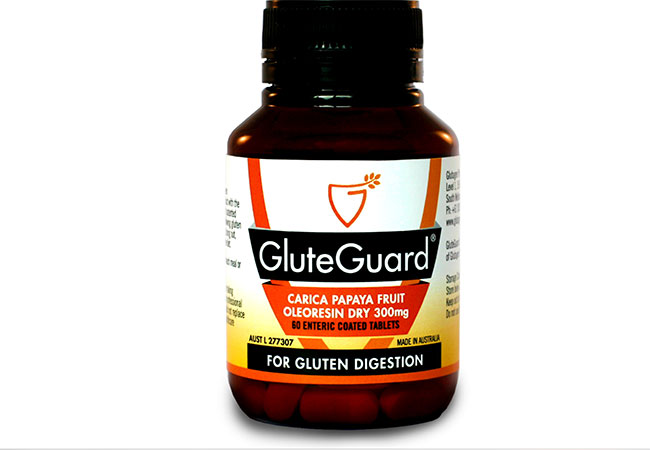
Gluten free eating made easy with GluteGuard
Gluten free eating made easy with GluteGuard

While many restaurants and at-home chefs now realise the need for gluten-free options, cross-contamination can still occur and the resulting symptoms can be just as severe. We talk to immunologist Dr James Rothel about a natural enzyme supplement that can do exactly that.
What is GluteGuard and who is it suited for?
GluteGuard is an all-natural, Australian-made enzyme supplement designed to assist people who are gluten sensitive by preventing or reducing the unpleasant and often debilitating symptoms experienced when gluten is unintentionally ingested. As such, it is a helpful support in the challenge of maintaining a gluten-free diet. GluteGuard is recommended for anyone seeking to prevent the symptoms of gluten ingestion, anyone wanting to maintain a gluten-free diet, or anyone looking to offset the possibility of gluten cross-contamination when food preparation is out of their control.
Where did the idea for GluteGuard come from?
Professor Hugh Cornell, who is a consultant to Glutagen, has conducted pioneering research in the fields of gluten intolerance and coeliac disease since the 1970s. Over the following four decades, the specific parts or peptides of gluten that are responsible for the symptoms were identified, and Professor Cornell and colleagues were able to identify enzymes that specifically digested these toxic peptides. Professor Cornell understood the everyday problems experienced by coeliacs in maintaining their gluten-free diet, and the frequency of coeliacs unintentionally consuming gluten when food preparation was out of their control. Realising there was an opportunity to assist those who are gluten sensitive by supplementing their diet with an enzyme, Professor Cornell collaborated with Dr Ted Stelmasiak and formed Glutagen with the mission of developing GluteGuard.
How does GluteGuard work to relieve the symptoms of gluten intolerance?
When taken immediately before a potentially gluten-contaminated meal, GluteGuard dissolves in the small intestine, releasing an enzyme that actively breaks down gluten at specific points of the molecule into smaller, harmless peptides; it thus prevents the symptoms associated with gluten-related issues. Think of it as a safeguard to your gluten-free diet. If you are feeling unsure about whether or not your food is truly gluten free, you can stress less knowing that GluteGuard can detoxify inadvertently ingested gluten.
What are the common symptoms people experience when they have some level of gluten sensitivity?
Common complaints associated with gluten include abdominal pain, bloating, nausea, diarrhoea and constipation. There are often additional neurological symptoms such as lethargy, fatigue, brain fog and poor concentration. For those diagnosed with coeliac disease, which involves a serious immune response to gluten, significant gut damage can be experienced when a gluten-free diet is not strictly complied with.
Can you tell us about the science behind the product?
For all people, gluten is a very complex protein for the body to digest. For those with gluten-related issues, specific fragments or peptides of gluten that are not digested go on to stimulate immune responses that in turn trigger unpleasant symptoms and, in the case of coeliacs, gut damage. The concept behind GluteGuard is simple, although the science was complex to develop: preventing symptoms by supplementing a person’s diet with an enzyme that will break down the toxic peptides of gluten before they can trigger an immune response.
Once the toxic peptides from gluten were identified, a search was conducted by Professor Cornell and colleagues for an enzyme that could specifically cleave or break down these peptides into harmless amino acid fragments. A natural enzyme called caricain, which is found in the skin of the unripe papaya fruit, was identified by laboratory studies as being highly potent in breaking down toxic gluten peptides. A tablet containing caricain was prepared with an enteric coating, which allows the tablet to pass untouched through the acidic environment of the stomach before dissolving and releasing the enzyme in the small intestine. This was essential as caricain is made inactive by the strong acids present in the stomach.
Clinical trials of the enteric-coated caricain tablets (GluteGuard) were then conducted in people with medically diagnosed gluten sensitivity - coeliac patients and patients with a gluten-related skin condition called dermatitis herpetiformis. These trials demonstrated that the GluteGuard tablets significantly protected patients from a daily challenge of approximately one to two grams of gluten – which is more than 20 times the minimum amount necessary to trigger symptoms in the most sensitive individuals. Patients taking placebo tablets generally suffered increased symptoms following the challenge with gluten and a significant percentage had to withdraw from the studies.
How easy is it for someone to accidentally consume gluten?
Gluten-free diet compliance is found to be challenging for many individuals, as it often requires reliance on others, such as members of the food industry, to be well informed about the specifics of gluten-related issues. In a 2016 study, 91 per cent of participants reported that gluten exposure occurred at least once a month, despite efforts to maintain a strict gluten-free diet, with cross-contamination often unsuspected until a reaction had occurred. Cross-contamination can be a possibility when travelling, when eating out or dining with friends - it is for this reason that GluteGuard has the potential to be life changing for so many individuals.
How might GluteGuard help someone with gluten intolerance while they’re dining out socially?
Rather than worrying about going out to a restaurant, travelling or indeed everyday eating when food preparation is out of their control, taking a GluteGuard tablet prior to eating a purportedly ‘gluten-free’ meal can provide confidence that individuals will not suffer from any inadvertently consumed gluten. This is why so many users of GluteGuard report an increased feeling of wellbeing and quality of life after utilising GluteGuard to help them maintain their gluten-free diet.

Find out more and get your hands on this game-changer here.















